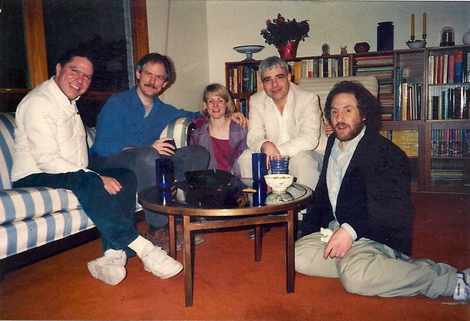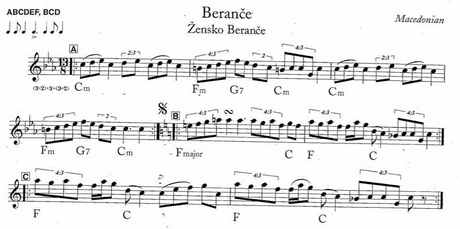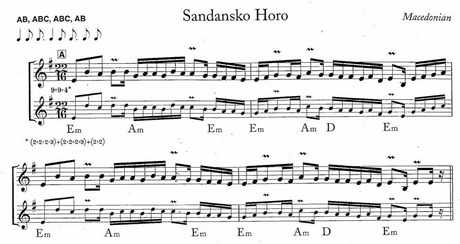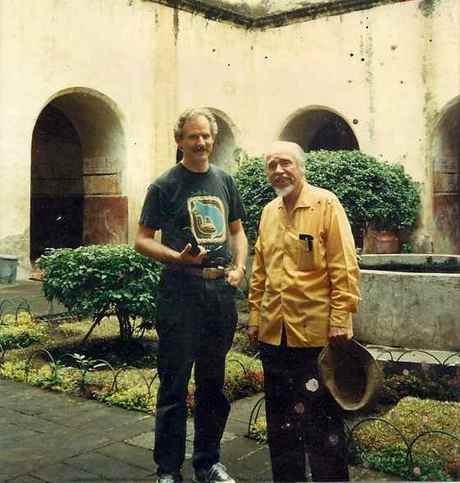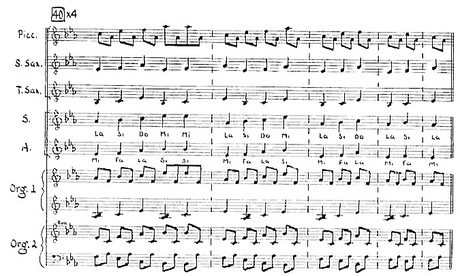I truly wish that it had been my lifelong dream to publish books about music, because it comes all too easily to me and I could have fulfilled my dream in short order. Unfortunately, in the late 1960s it became my passion to write music and get it performed, which 40 years later I still find a more challenging proposition (the getting-performed part, I mean). Writing a book is a solitary occupation that sometimes actually pays for itself; putting out a CD requires tremendous enthusiasm from performers and cooperation from sound engineers, plus a vast financial structure to make sure everyone gets paid, with virtually no money guaranteed to come back in return. Each book I publish feels like a cakewalk compared to the CDs I struggle like hell to put together. Yet had I put out 30 CDs in my life and no books, I would have been tickled pink with my career. Instead, I find myself writing a book now and then just to take up the slack.
Archives for September 2008
Cleaning Out My Office
Macho Meters
Anyone ready for another year of music theory talk? I did my annual shtick this week on odd meters. You can anticipate me: Holst’s “Mars,” the ancient Greek “Hymn to Apollo,” and Brubeck’s Take Five for quintuple meter; Pink Floyd’s “Money” for seven; a long passage from Roy Harris’s Seventh Symphony, plus a Bulgarian “Krivo Horo” for eleven; the “Blues” movement of Ben Johnston’s Suite for microtonal piano for thirteen; Waylon Jennings’s “Amanda” for fifteen; and the end of the first movement of my Desert Sonata for a long passage in 41/16 meter. Only this year, I have a student, Benjamin Bath, who grew up in a Greek family and going to Greek weddings and all that, and every meter I’d start to mention, he’d reel off all the traditional Greek and Macedonian and Bulgarian songs, and already knew the couple I played. So Monday he brought in a book, The Pinewoods International Collection selected by Tom Pixton and published by NightShade, and let me copy some examples. Try humming through this little number:
[T]he Bulgarians DO NOT count out every “8th” or “16th” note while performing their music. They express them as long and short beats. They actively discourage trying to count it out, and expressed that the only way to hope to begin to play it accurately would be to feel the long and short beats.
Cleaning Up a Life
John Cage’s life is getting sorted out, but you need to pick and choose your sources. David Tudor and Morton Feldman were both Stefan Wolpe students, and nearly everyone says Cage met Tudor through Feldman, but actually (according to Tudor scholar John Holzaepfel), Tudor was also sometime accompanist for dancer Jean Erdman, in whose apartment Cage and Xenia ended up living when they first came to New York in 1942. (Cage and Feldman met January 26, 1950.) Cage knew Tudor first through Erdman.
Revising History
John Cage, in Silence:
While Meister Eckhart was alive, several attempts were made to excommunicate him… None of the trials against him was successful, for on each occasion he defended himself brilliantly. However, after his death, the attack was continued. Mute, Meister Eckhart was excommunicated. (p. 193)
the problem of why Eckhart himself did not put up a better defense… The years… of paradox-spinning for the scandalized delight of larger but less critical and instructed audiences do not seem to have sharpened his wits… [W]e can perhaps detect signs of the apathetic fatigue experienced by an aging man, aware that he has not fulfilled his early promise and has exhausted his powers in his efforts to woo popular acclaim. (p. 14.)
I’m at the point at which every day I finish half of what’s left of this book, but the final tiny pieces get harder and harder.
That Obscure Disc of Desire
One thing I could sure use before finishing this book on 4’33” is an obscure recording on the Korm Plastics label called 45’18” (Forty-five Minutes, Eighteen Seconds). It’s a CD of nine versions of 4’33” by Thurston Moore, Keith Rowe, the Deep Listening Band, Voice Crack, and others. It doesn’t seem to be available anywhere at the moment. Is there someone out there who could dupe me a copy, with program info? I’d gladly pay a reasonable price for a CDR. (I mean, I am paying basically for silence, but it’s really important silence.)
Musically At Home in the Land of Fountains and BBQ
Wow – I’ve hiked Arches, I’ve been hit by an 18-wheeler in Atoka, Oklahoma, I’ve ordered a steak in Lincoln, Nebraska, I’ve been photographed in a cowboy hat in the Badlands, I’ve scoured the Little Bighorn battlefield, and the Memphis pyramid and St. Louis arch are overly familiar landmarks for me, but somehow in all my travels across this country I seem to have missed Kansas City – postminimalism capitol of the world – until this week. I was down there lecturing at the conservatory at UMKC (Mikel Rouse, alumnus) and hearing the newEar ensemble play my Chicago Spiral, and most of all scoping out the place with my co-director David McIntire for next year’s minimalism conference. What a clean, affluent looking city! Fountain city of America, boasting more big fountains than any world city beside Rome, and they were everywhere. I had no idea there was an art museum as impressive as the Kemper between Philadelphia and California south of Chicago. But what excited me most was the enthusiasm for minimalism and its offshoots at UMKC, and the expert grad-student/faculty crew David has assembled to get things rolling.
We’ve got grad student Jedd Schneider, singer and musicologist, who’s written an analytical paper on M.C. Maguire’s A Short History of Lounge, and whose contribution to the conference will be a paper on the operas of Michael Gordon. We’ve got Scott Unrein, the Harold Budd of the midwest, who keeps coming up with minimalist CDs I didn’t know existed. We’ve got pianist Andy Lee, who’s playing music by Bill Duckworth. We’ve got musicologist Andrew Granade, who’s writing a book on how Harry Partch’s hobo years, and the image of the hobo in American culture, influenced Partch’s music. Most amazing of all, the UMKC conservatory has a brand-new dean, conductor Peter Witte (only three weeks on the job), who reads my blog (hi, Peter!) and who knew about this conference even before he applied for the job, and who’s fully committed to it. What a cast. And David and I are such Virgil Thomson freaks (he’s promised to show me the great man’s grave an hour north of KC) that we joked all week about how we were going to slip a panel about Virgil onto the program.
I also met amazing electronic composer/motorcycle enthusiast Paul Rudy, whom students had raved about to me, and who shares my penchant for native American spirituality. Paul makes incredibly beautiful music from musical tones and environmental sounds of widely varying recognizability, and I’ve uploaded his CD-length work In lake’ch* (Mayan for “I am another yourself”) to PostClassic Radio. Paul and I devoutly agreed that there’s no line between art and entertainment, and that all good art is entertaining – though he holds the theory, which impressed me, that art = entertainment + ambiguity; in other words, if it’s completely unambiguous, it’s merely entertainment, but the more ambiguity you add in, the more the listener has to mentally participate to parse what’s going on, the more it becomes art. I like it.Â
And so now I’m so charged up that it kills me that the conference is still a year away. We’re featuring Charlemagne Palestine, Tom Johnson, my old friend Robert Carl (keynote speaker, having freshly completed a book on In C), and Mikel Rouse. I spend a lot of time feeling like my view of music is a minority within a minority within a minority, but some of my gigs out there in the heartland lately have made me think that, actually, much of America and I are right in sync, and it’s only the dying Northeast that’s nostalgically gazing into the past. We talked a lot all week about how, if you’re a composer who made out like a bandit in the world of orchestral modernism, then of course you cling to modernism with all your might. But if you didn’t really make it in that world – and a lot of those composers ended up out west in KC and other less visible places – you just shrug, move on, and stay abreast of the times. As Paul Rudy said, “We’re going through a big paradigm shift, and I want to be on the front end of that shift, not the back end.” Amen to that. Still, also at UMKC are orchestral star Chen Yi and high-tech composer Jim Mobberley, whom David credits with for department’s incredibly open-minded aesthetic attitudes. There was also independent KC composer Brad Fowler (hi Brad!), whose music I haven’t heard yet, but look forward to. Suffice it to say that for a few days I was surrounded by simpatico aesthetic allies, a situation I could never get here in the Hudson Valley. I felt more at home than I have in years. This minimalism conference is going to be an incredible trip.
*By the way, I’ve also been adding other new music to PostClassic Radio lately by Joseph Pehrson, Stephen Scott’s Bowed Piano Ensemble, Rodney Sharman, Carl Stone, the Rara Avis Duo, Mark Hagerty, Guy Klucevsek, Cynthia Folio, James Tenney, and Bernard Gann. If you haven’t listened lately, lots o’ new content.
Browning on the Sonata
In my Sonata class I play the first movement of a sonata by Baldessare Galuppi, and then I read my second-favorite Robert Browning poem, A Toccata of Galuppi’s. Along with Richard Wilbur’s C Minor, it’s one of my favorite music poems ever written:
I
Oh Galuppi, Baldassaro, this is very sad to find!Â
I can hardly misconceive you; it would prove me deaf and blind;Â
But although I take your meaning, ’tis with such a heavy mind!Â
IIÂ
Here you come with your old music, and here’s all the good it brings. Â
What, they lived once thus at Venice where the merchants were the kings,Â
Where Saint Mark’s is, where the Doges used to wed the sea with rings?Â
IIIÂ
Ay, because the sea’s the street there; and ’tis arched by… what you call… Â
Shylock’s bridge with houses on it, where they kept the carnival:Â
I was never out of England–it’s as if I saw it all.
IVÂ
Did young people take their pleasure when the sea was warm in May?Â
Balls and masks begun at midnight, burning ever to mid-day, Â
When they made up fresh adventures for the morrow, do you say?Â
VÂ
Was a lady such a lady, cheeks so round and lips so red,–Â
On her neck the small face buoyant, like a bell-flower on its bed,Â
O’er the breast’s superb abundance where a man might base his head?Â
VIÂ
Well, and it was graceful of them–they’d break talk off and afford Â
–She, to bite her mask’s black velvet–he, to finger on his sword, Â
While you sat and played Toccatas, stately at the clavichord?Â
VIIÂ
What? Those lesser thirds so plaintive, sixths diminished, sigh on sigh, Â
Told them something? Those suspensions, those solutions–“Must we die?”Â
Those commiserating sevenths–“Life might last! we can but try! Â Â
VIIIÂ
“Were you happy?” –“Yes.”–“And are you still as happy?”–“Yes. And you?”
—
“Then, more kisses!”–“Did I stop them, when a million seemed so few?”Â
Hark, the dominant’s persistence till it must be answered to! Â Â
IXÂ
So, an octave struck the answer. Oh, they praised you, I dare say! Â
“Brave Galuppi! that was music! good alike at grave and gay! Â
“I can always leave off talking when I hear a master play!”Â
XÂ
Then they left you for their pleasure: till in due time, one by one,Â
Some with lives that came to nothing, some with deeds as well undone, Â
Death stepped tacitly and took them where they never see the sun.Â
XIÂ
But when I sit down to reason, think to take my stand nor swerve,Â
While I triumph o’er a secret wrung from nature’s close reserve,Â
In you come with your cold music till I creep thro’ every nerve.Â
XIIÂ
Yes, you, like a ghostly cricket, creaking where a house was burned:Â
“Dust and ashes, dead and done with, Venice spent what Venice earned.Â
“The soul, doubtless, is immortal–where a soul can be discerned.Â
XIIIÂ
“Yours for instance: you know physics, something of geology,Â
“Mathematics are your pastime; souls shall rise in their degree;Â Â
“Butterflies may dread extinction,–you’ll not die, it cannot be!Â
XIVÂ
“As for Venice and her people, merely born to bloom and drop, Â
“Here on earth they bore their fruitage, mirth and folly were the crop:Â Â
“What of soul was left, I wonder, when the kissing had to stop?Â
XVÂ
“Dust and ashes!” So you creak it, and I want the heart to scold.Â
Dear dead women, with such hair, too–what’s become of all the goldÂ
Used to hang and brush their bosoms? I feel chilly and grown old.
Browning slightly misspells Galuppi’s first name, and his mention of “sixths diminished” is musically inaccurate – some musician should have told him it should have been “sixths augmented,” and he would have been musically perfect. As an eloquent Romantic statement on the cold superficiality of the 18th-century Rococo, it is deliciously insightful.Â
Up to Date in KC, No. 2
For the next few days I’ll be in Kansas City. I’m giving a couple of lectures to historians and composers at the University of Missouri, and on Saturday evening, 8 PM (with a preconcert talk at 7:15), the town’s premiere new music ensemble newEar is performing my 1991 work Chicago Spiral. The concert’s at All-Souls Unitarian Universalist Church, 4501 Walnut Street.  Also on the program are Wayne Siegel’s delightful Jackdaw, three pieces from David Lang’s Child, Imanaka by very talented young Kansas City composer Scott Unrein, and Mysterious Numbers, a beautiful orchestra piece by William Duckworth. Quite the postminimalist program. And I’ll be planning out next year’s minimalism conference with my codirector David McIntire.Â
Compliment from the Grave
Please pardon my self-indulgence in mentioning this, but musicologist Dragana Stojanovic-Novicic sends me an excerpt from a letter she found in the Paul Sacher Stiftung from Nancarrow to Charles Amirkhanian, and she insists that I blog it. It says,
I forgot to tell you, Kyle Gann is going to do my biography. Before I went to Germany he was here for a few days and we had a very pleasant visit. I had never heard of him before, but he brought a cassette of his music, and apart from being very simpatico he is a very good composer.
The Right to Steal Shall Not Be Abridged
And man, what a blast. Whenever I go through a piece of music I know well with the score for the first or second time, my opinion of the piece either rises or falls somewhat, depending on what I start to perceive in the piece once I fully realize what’s going on. Einstein was a vastly important piece from my youth, and while I always loved sections of it, my opinion of the whole has risen noticeably this week. (I had an opposite experience with Glass’s later opera The Voyage, a more tedious work than I’d remembered.) Today we went through the “Train” scene in about an hour and a half, and broke it down into an A A’ B A” B form – it’s the most complex scene from the opera, bringing together two of the recurring chord progressions (there are only about five in the whole four-hour work), as well as running ostinatos of different lengths together, Totalist style – which I may have to start calling Minimalist style. There’s a returning transitional passage (“x”) between the other sections, so it’s really A x A’ x B x A” x B, and the three A sections all fall into the same material after awhile, but start out with a different additive-process buildup. (The B sections recur in the final “Spaceship” scene.) In short, the form is both musically logical and satisfyingly intuitive. We had a similar experience with Reich’s Music for Mallet Instruments, Voices, and Organ, and I’m not even going to tell you where I got that rare score – one of the prettiest pieces ever made. Much as I love so much minimalist repertoire, I somehow don’t expect it to excel in the intuition department, and I’m being pleasantly surprised.
And now I’m pissed off as hell that I had to wait until age 52 to get a score to Einstein, a piece I’d been obsessed with since I was 22. I was wearing out my vinyl discs of this piece nonstop in 1978, and a score should have been available for sale at Patelson’s by 1980, so I could have learned all of Glass’s (and Reich’s) formal tricks before I embarked on my professional career. Instead, I find out that I correctly stole some of their ideas by ear, but there were some other neat formulas that I didn’t realize were there. It’s criminal that great music can’t pass in score form to younger composers within a few years. And it’s why I put nearly all my scores up as PDFs on my web site: I refuse to catapult any ideas out into the world without facilitating their immediate theft by young (or older) composers. I may not have any ideas anyone wants to rip off, but I’ll be damned if I’m going to squirrel them away out of reach.
Too Many Pitches in Urbana
I only learned today that innovative young microtonalist Jacob Barton is playing my keyboard sampler piece Fugitive Objects tonight at a microtonal marathon at the Red Herring Coffeehouse in Urbana, Illinois between 8 PM and 1 AM. It’s happening as I write. Also on the program, according to Jacob: “Three Short Poems” set in 7-limit just intonation by Paul Kotheimer, some 17-equal songs
accompanied by the çümbüs, a sort of Turkish banjo, and a minimalist jam “In Something Else” (In C but different phrases). Sounds wild.
Scholarly Confirmation Requested
Everyone knows that Gita Sarabhai gave to John Cage the definition of the purpose of music that her teacher had given her: “to quiet the mind and render it susceptible to divine influences.” And everyone knows that Cage found confirmation for this definition in the fact that his friend Lou Harrison found the same words in a 1676 publication by the lutenist Thomas Mace. But I’ve been through just about all of Mace’s Musick’s Monument, his only treatise on music and his only book published that year, and I can’t find any such words. I haven’t yet plowed through all the practical sections on playing the lute, admittedly, but Mace is so verbose, so rarely concise, that no such pointed phrase seems possible in his style. The closest I’ve found is his statement that, listening to an organ,Â
I was so transported and wrapt up into High Contemplations that there was no room left in my whole Man, viz., Body, Soul and Spirit for anything below Divine and Heavenly Raptures.Â

